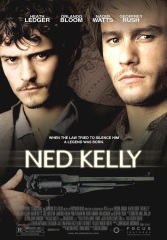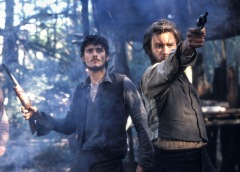| Ned Kelly |
| |
 |
Australia, 2003. Rated R. 109 minutes.
Cast:
Heath Ledger, Orlando Bloom, Naomi Watts, Geoffrey Rush, Laurence Kinlan, Philip Barantini, Joel Edgerton, Kiri Paramore, Kerry Condon, Kris McQuade, Emily Browning, Rachel Griffiths, Geoff Morrell
Writer: John Michael McDonagh, based on the book Our Sunshine, by Robert Drewe
Original Music: Klaus Badelt
Cinematography: Oliver Stapleton
Producers: Nelson Woss, Lynda House
Director: Gregor Jordan
LINKS
|
 ed Kelly. The name means nothing to most of the world, except Australians. There Ned Kelly is known as a colorful 1870s Irish-Australian outlaw—a vicious murderer and bank robber to the English gentry of the time, and a Robin Hood-style folk hero to the disenfranchised first-generation Irish immigrants. Though the legend of young Kelly and his gang of underdogs continues to grow, he remains a divisive historical figure to this day. As in most such cases, the real Ned Kelly probably embodied a little of both hero and criminal, presenting a compelling subject for cinematic treatment. That treatment comes via the largest-ever (according to director Gregor Jordan) Australian film production, the imaginatively titled Ned Kelly.
ed Kelly. The name means nothing to most of the world, except Australians. There Ned Kelly is known as a colorful 1870s Irish-Australian outlaw—a vicious murderer and bank robber to the English gentry of the time, and a Robin Hood-style folk hero to the disenfranchised first-generation Irish immigrants. Though the legend of young Kelly and his gang of underdogs continues to grow, he remains a divisive historical figure to this day. As in most such cases, the real Ned Kelly probably embodied a little of both hero and criminal, presenting a compelling subject for cinematic treatment. That treatment comes via the largest-ever (according to director Gregor Jordan) Australian film production, the imaginatively titled Ned Kelly.
Ned Kelly doesn't try to unravel Kelly's complicated history, however. Based as it is on a fictionalized account (Our Sunshine by Robert Drewe), Ned Kelly is interested in recounting the legend, with Jordan (Buffalo Soldiers) and screenwriter John Michael McDonagh definitely taking a heroic perspective on their protagonist. They bend over backwards (enough to make a contortionist wince) to portray Kelly as an honorable man driven to misdeeds by circumstances and false accusations. Every single time Kelly takes some violent action, they give us a scene of him protesting that he doesn't want to shoot anybody. As for those horse-thieving charges that launched Kelly's criminal career—trumped up, every last one of them, as far as the film is concerned.

Orlando Bloom (left) and Heath Ledger raise their pistols in Ned Kelly. |
That's the tone from the outset, when the film opens with Ned Kelly, as a child, rescuing another boy from drowning and being awarded the silk hero's sash of green and gold. The film then touches on the highlights of Kelly's life, including his unfair imprisonment as a teenager for horse theft (and his even more unfair prison haircut); the incident with Constable Alexander Fitzpatrick (who has designs on Kelly's sister) that causes Kelly and his friends to flee into the wilderness; the Kelly Gang's two bank robberies; the dictation of a rambling letter of defiance to the authorities at Jerilderie; and the surreal final shootout at Glenrowan, in which the Kelly Gang wore medieval-looking suits of armor that are on display in museums today. The film contains egregious bits of fiction as well, such as an invented and irrelevant love interest, Julia (Naomi Watts), whose inclusion is justified based on a passing mention of a Julia in the Jerilderie Letter. (She does serve a symbolic purpose, but was probably created for more commercial considerations. Films with attractive female stars make more money.)
Basically, Ned Kelly is an Australian Western. As such, it is not the most original film, betraying the overt influence of a number of movies ranging from Butch Cassidy and the Sundance Kid to Les Miserables, with Geoffrey Rush, who played Inspector Javert in the most recent cinematic production of Victor Hugo's classic, in a similar role as Superintendent Francis Hare. As Kelly, Heath Ledger (A Knight's Tale, The Patriot) makes a credible young hero, cutting a commanding figure with just enough vulnerability to humanize him. Orlando Bloom (The Lord of the Rings, Pirates of the Caribbean) is a reasonably dashing, if not terribly imposing, first lieutenant.
Where Ned Kelly deviates from more traditional melodramatic hero-ographies is in its visual and symbolic landscape. There are moments in Ned Kelly reminiscent of more esoteric Australian films like Picnic at Hanging Rock. In addition to copious but subtle use of foreshadowing (a Englishman who shoots a horse that can't be broken, a drawing of a samurai warrior that presages the armor used in the final standoff), Jordan establishes a link between Kelly and the natural landscape. In one intense scene, the Kelly Gang must feed on horse's blood to avoid dying of thirst. In the final battle, a circus lion is riddled with stray bullets in its cage. Predators such as snakes and komodo dragons return to the scene of a forest fire to scavenge for carcasses, depicting an animal world that perseveres in the wake of human destruction, as it had before humans arrived. The point being made is that the Kelly Gang is so elusive because the Irish immigrants have learned to live within their new Australian environment, while the English seek to impose their will on it.
What is the truth about Ned Kelly? The film's heroic take is not necessarily wrong—no one can say that. It's just that Ned Kelly is more an idealization than an argument for one interpretation as opposed to another. While the film does manage to convey what Kelly meant to the ill-treated Irish immigrants who saw him as a revolutionary, McDonagh and Jordan's cinematic treatment adds to the Kelly legend while doing nothing to rescue the truth from it. Ned Kelly is a compelling and enjoyable movie, but in the end, that's all it is.
Review
© March 2004 by AboutFilm.Com and the author.
Images © 2004 Focus Features. All Rights Reserved.


